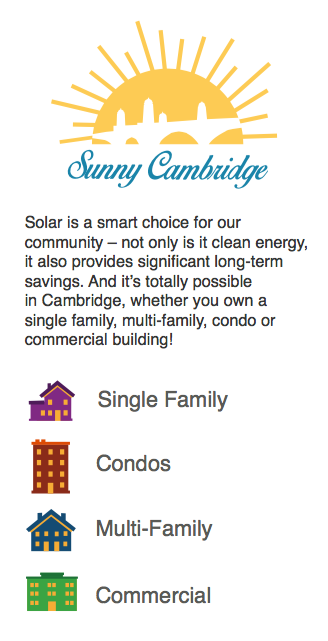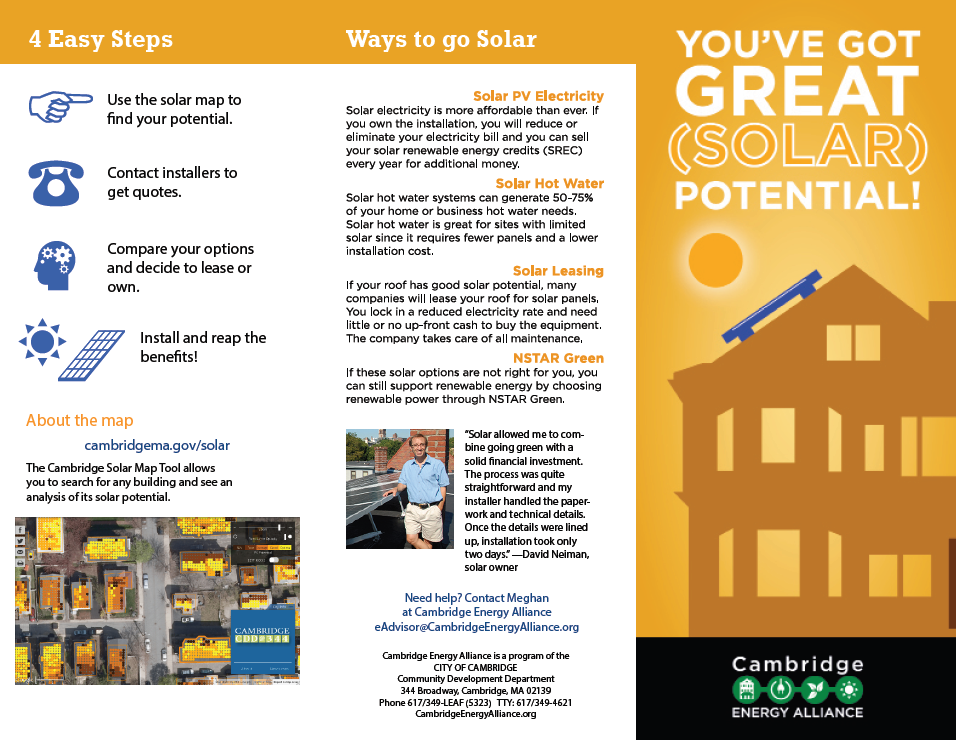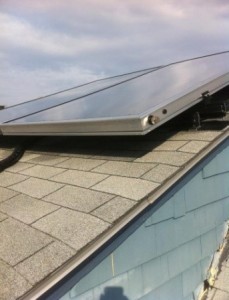Sunny Cambridge
It's always Sunny in Cambridge!
Sunny Cambridge is the city-wide initiative that makes it easy for all types of residents to get solar power for their homes. Cambridge has lined up local solar installers through the EnergySage Solar Marketplace, which helps you request, receive and compare solar quotes 100% online with support available every step of the way.
Sunny Cambridge makes it easier for condominiums and other multi-family homes to go solar than ever before! Find out how by viewing this guide to Sunny Cambridge’s Online Resources for Condominiums and Multi-Family Homes!
Sunny Cambridge is just one of the ways that the City of Cambridge is helping residents to reduce energy use and make the city more sustainable. The City also encourages residents to take action to save energy, save money, and protect the environment by using some of our DIY Energy Tips or signing up for a no-cost home energy assessment.
Switch to 100% Renewable Energy Today!
The Cambridge Community Electricity program allows Cambridge residents and businesses to support the development of new local renewable energy projects.
There are currently two options, Standard Green and 100% Green Plus. Both options offer more renewable energy than what’s included in the Eversource Basic Service.
- Standard Green
- 100% Green Plus
Standard Green participants receive the minimum amount of renewable energy reuired by the state (14%), all from projects in New England. This brings the benefits of renewable energy and offers it at a price lower than or equal to Eversource Basic Service supply rate. Participants also contribute directly to the development of a new solar project in Cambridge through a small $0.002/kWh charge, bringing new renewable energy to the grid and helping displace fossil fuel power production.
100% Green Plus is an optional opt-in program where participants receive 100% renewable energy. This energy originates from projects in New England through 100% Massachusetts Class I RECs purchased on their behalf. In addition, participants contribute to the develop of a new solar project in Cambridge through a $0.002/kWh charge. This 100% Green Plus program helps create a stronger market for renewable energy generated by projects in New England and brings more renewable energy to the grid.
Interested in signing up? Click here for more information and sign up here for 100% green energy.
Solar Photovoltaic (PV)
Energy from the sun’s rays excites electrons within the solar cells on a photovoltaic (PV) panel to create electricity. Output from the panels depends on weather and time of year, and at night or during extended cloud cover the building may revert to using electricity from the utility grid. There are a number of ownership and financing options available to help you get solar PV panels on your roof. Are you interested in solar PV? Go to sunnycambridge.org to request no-obligation solar quotes online for free, and check out our solar guides to help you get started!
Community Shared Solar

Tried to go solar but can’t? Community Shared Solar (CSS) is a co-operative solar model that helps bring solar to those who typically wouldn’t have access to it, such as renters or any households without enough rooftop sun exposure. CSS allows customers to buy into an off-site system and receive credits on their utility bills. Customers can purchase as much or as little solar energy as they want, and they don’t have to worry about installation or maintenance. Check our current solar promotions for community shared solar projects in the area.
Cambridge’s Solar Capacity
Have you ever wondered how much solar capacity Cambridge has? Now you can explore solar’s growth in Cambridge over the past 20 years!
Are you next? Start receiving quotes today at Sunny Cambridge!
Solar Finance

Mass Solar Loan provides new financing options for Massachusetts residents and homeowners to directly own solar installations. The $30 million program provides funds to banks and credit unions to create residential solar electric project loans that give more individuals the option to own solar. Mass Solar Loan enables lenders to provide low interest rate loans and make loans available to moderate income and lower credit score borrowers. It also provides subsidies of up to 30% of the installation cost for income-qualified households.
Homeowners interested in the Mass Solar Loan program can visit their website to find a list of qualified program installers and lenders.
Solar installers must qualify to participate in the program and should email solarloan masscec
masscec com for more information. Interested installers can register on the Mass Solar Loan application portal here. Visit the website for a walk-through of the registration process and a webinar on how to enter technical applications in the application portal.
com for more information. Interested installers can register on the Mass Solar Loan application portal here. Visit the website for a walk-through of the registration process and a webinar on how to enter technical applications in the application portal.
Banks and credit unions must qualify to participate in the program and should email solarloan masscec
masscec com for more information and for training on the Mass Solar Loan application portal.
com for more information and for training on the Mass Solar Loan application portal.
To learn more, please visit the Mass Solar Loan website and read the final program documents. Further information on financing options for residential solar, including loans, leases, and PPAs, can be found in the Massachusetts Homeowner’s Guide to Solar Financing.
Current Solar Promotions

Relay Power
Cambridge is currently partnering with Relay Power, a Boston-based company that specializes in community solar, to help people who can’t get rooftop solar. Anyone who pays an electric bill can subscribe to Relay Power’s new community solar garden in Dover, MA. Participants pay nothing up front and save 10% on their electricity. After subscribing to the project, no further effort is required from you and the solar credits will be automatically transferred to offset your bill. The site is not constructed yet but will likely go live around May, and space is limited!
If you would like to talk to someone to learn more about the program and reserve your spot, please tell Relay Power you’re interested here.
Solstice Initiative
Cambridge is currently partnering with Solstice Initiative, a local social enterprise, to help people who can’t get rooftop solar. Solstice allows anyone with an electric bill to subscribe to a community solar garden in their neighborhood. There is no roof required, no cost to join, and participants will save 10% on their monthly electric bill.
We encourage Cambridge residents to consider this clean energy opportunity. There is limited space available in the nearby solar garden, so register your interest here. For questions, contact Sean Hutton at sean solstice
solstice us (sean
us (sean solstice
solstice us) .
us) .
Resonant Energy’s Solar Access Program
Cambridge is excited to be partnering with Resonant Energy, a company working to break down the financing barriers that can prevent residents with good solar potential from going solar.
Resonant Energy’s Solar Access Program allows any building with a good roof for solar — regardless of the owners’ income or credit score — to host solar panels in exchange for clean power and energy savings. Unlike a standard PPA, the Solar Access Program does not require cash payments or restrictive purchasing contracts.
Resonant Energy says about their program:
“Through our Solar Hosting Agreement, any household can lease their roof to Resonant Energy. We’ll build a solar system on it, and give you part of the system’s power output in the place of a lease payment. Project hosts typically see electricity savings in the range of 20% – 50%, which is two to five times higher than the savings offered under standard PPAs.
And if you’re a renter? No problem. Resonant Energy will give half the savings to your landlord for letting us use the property, and half to you for participating in the project.”
Learn more about this program and sign up here.
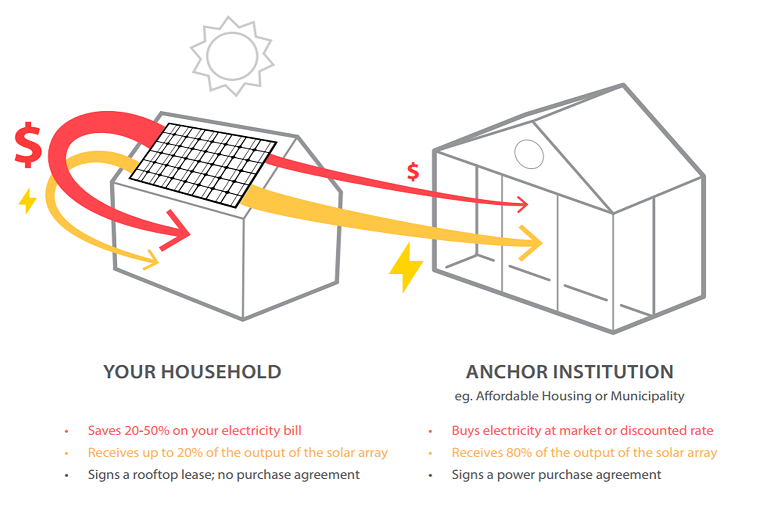
Photovoltaic Ownership Models
- Own Your Panels
- Solar Power Purchase Agreement (PPA)
- Other Options
Owning your own panels is more affordable than ever. If you own the installation, you will reduce or eliminate your electricity bill and you can sell your solar renewable energy credits (SRECs) every year for additional money. See our section on financing to view the many programs available to help you finance your solar investment.
If your roof has good solar potential, many companies will install panels on your roof for little or no upfront cost. The company then owns, operates, and maintains the panels. In return, you agree to purchase the power generated by the panels at a set price, and the company receives the solar renewable energy credits (SRECs) that the panels generate. For more information about the costs and benefits of PPAs, view this reference guide.
Check our current promotions!
Solar Installation Guides
The City of Cambridge has created these guides to help you through the solar decision-making and installation processes. The presentations from our Sunny Cambridge info sessions can also be found below. Check them out!
Sample Heading
Check Your Solar Potential
Get an estimate of your building’s solar energy potential using Cambridge’s interactive solar map. Developed by Mapdwell, a collective of MIT academics and professionals, the map allows users to click on a given property to learn its solar potential, including financial implications.
To learn how to use the map, see this easy-to-follow video by MoDe Studios.
Check out this article from the Atlantic CityLab to learn how the map was made.
Solar Hot Water
Using the sun’s energy to heat your domestic hot water is clean and economical. A passive solar hot water system (also called solar thermal) warms a large volume of water in a sunny spot (such as a roof) and gravity feeds the warm water into the hot water heater for storage without the use of pumps or controls. An active system uses pumps to continuously pipe water through large panels that concentrate the sun’s rays and quickly heat it.
A direct system is the simplest—the water warmed by the sun is the same water used for bathing and washing clothes. An indirect system involves an additional step—the liquid warmed by the sun flows into a heat-transfer unit where it warms the cold water as it flows into the traditional hot water tank. The warming solution can also be water, but an anti-freeze solution is preferable in cold climates because it won’t freeze.
I am text block. Click edit button to change this text. Lorem ipsum dolor sit amet, consectetur adipiscing elit. Ut elit tellus, luctus nec ullamcorper mattis, pulvinar dapibus leo.
I am text block. Click edit button to change this text. Lorem ipsum dolor sit amet, consectetur adipiscing elit. Ut elit tellus, luctus nec ullamcorper mattis, pulvinar dapibus leo.
I am text block. Click edit button to change this text. Lorem ipsum dolor sit amet, consectetur adipiscing elit. Ut elit tellus, luctus nec ullamcorper mattis, pulvinar dapibus leo.
I am text block. Click edit button to change this text. Lorem ipsum dolor sit amet, consectetur adipiscing elit. Ut elit tellus, luctus nec ullamcorper mattis, pulvinar dapibus leo.
